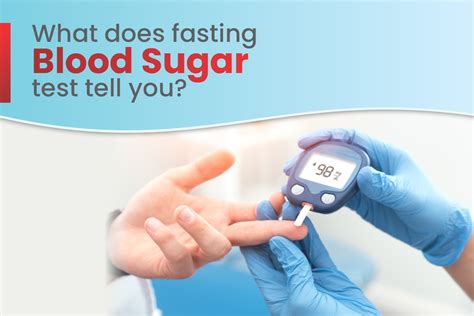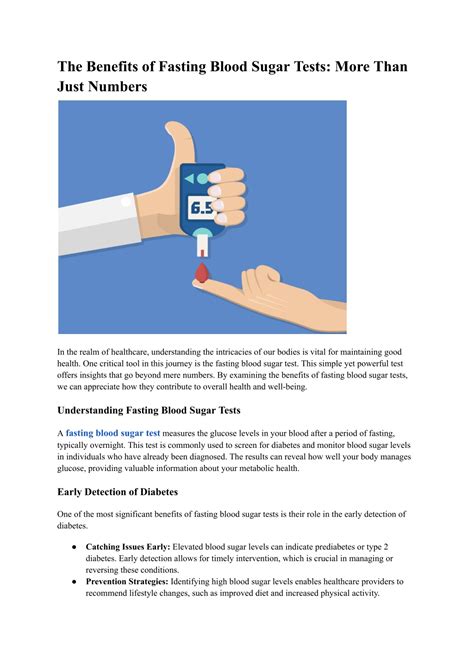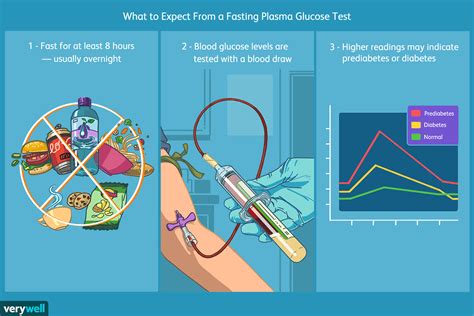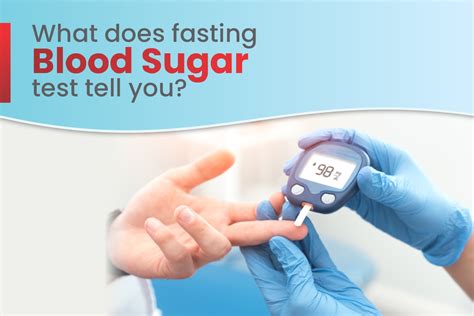Intro
Learn about the Fasting Blood Sugar Test, a crucial diagnostic tool for diabetes management, measuring glucose levels, and monitoring blood sugar control, with insights on normal ranges, test preparation, and results interpretation.
The importance of monitoring blood sugar levels cannot be overstated, especially for individuals who have been diagnosed with diabetes or are at risk of developing the condition. One of the most common methods used to check blood sugar levels is the fasting blood sugar test. This test is a crucial tool for diagnosing and managing diabetes, as it provides valuable insights into how the body regulates blood sugar levels. In this article, we will delve into the world of fasting blood sugar tests, exploring their significance, benefits, and what the results mean for individuals.
The fasting blood sugar test is a simple and straightforward procedure that involves measuring the level of glucose in the blood after an overnight fast. This test is typically performed in the morning, before breakfast, and is used to diagnose and monitor diabetes, as well as to assess the effectiveness of treatment plans. The test is essential for individuals who have been diagnosed with diabetes, as it helps healthcare providers to adjust medication and treatment plans to achieve optimal blood sugar control. For individuals who are at risk of developing diabetes, the fasting blood sugar test can help identify potential problems early on, allowing for prompt intervention and prevention.
The significance of the fasting blood sugar test lies in its ability to provide a snapshot of how the body regulates blood sugar levels. When we eat, our body breaks down carbohydrates into glucose, which is then absorbed into the bloodstream. The pancreas responds by releasing insulin, a hormone that helps to regulate blood sugar levels by facilitating the uptake of glucose by cells. In individuals with diabetes, the body either does not produce enough insulin or is unable to effectively use the insulin it produces, leading to high blood sugar levels. The fasting blood sugar test helps healthcare providers to understand how well the body is regulating blood sugar levels, even when we are not eating.
What is a Fasting Blood Sugar Test?

How to Prepare for a Fasting Blood Sugar Test
To prepare for a fasting blood sugar test, individuals are typically required to fast for at least 8 hours before the test. This means avoiding all food and drink, except for water, during this period. It is essential to follow the instructions provided by the healthcare provider or laboratory to ensure accurate results. Individuals should also avoid smoking and exercising before the test, as these activities can affect blood sugar levels.Benefits of Fasting Blood Sugar Tests

Some of the benefits of fasting blood sugar tests include:
- Helping to diagnose and monitor diabetes
- Assessing the effectiveness of treatment plans
- Identifying potential problems early on
- Monitoring blood sugar levels over time
- Helping to adjust medication and treatment plans
Understanding Fasting Blood Sugar Test Results
The results of a fasting blood sugar test are usually measured in milligrams per deciliter (mg/dL) or millimoles per liter (mmol/L). The normal range for fasting blood sugar levels is typically between 70 and 100 mg/dL (3.9 to 5.5 mmol/L). Levels above 100 mg/dL (5.5 mmol/L) may indicate impaired fasting glucose or diabetes.Here are some general guidelines for interpreting fasting blood sugar test results:
- Normal: 70-100 mg/dL (3.9-5.5 mmol/L)
- Impaired fasting glucose: 101-125 mg/dL (5.6-6.9 mmol/L)
- Diabetes: 126 mg/dL or higher (7.0 mmol/L or higher)
Factors that Affect Fasting Blood Sugar Test Results

Tips for Maintaining Healthy Blood Sugar Levels
Maintaining healthy blood sugar levels is crucial for overall health and well-being. Here are some tips for maintaining healthy blood sugar levels: * Eat a balanced diet: Focus on whole, unprocessed foods like vegetables, fruits, whole grains, lean proteins, and healthy fats. * Stay hydrated: Drink plenty of water throughout the day to help regulate blood sugar levels. * Exercise regularly: Aim for at least 150 minutes of moderate-intensity aerobic exercise, or 75 minutes of vigorous-intensity aerobic exercise, or a combination of both, per week. * Get enough sleep: Aim for 7-9 hours of sleep per night to help regulate blood sugar levels. * Manage stress: Try stress-reducing techniques like meditation, yoga, or deep breathing exercises.Common Mistakes to Avoid When Taking a Fasting Blood Sugar Test

What to Expect During a Fasting Blood Sugar Test
During a fasting blood sugar test, a healthcare provider or laboratory technician will draw a blood sample from a vein in the arm. The test is usually performed in the morning, before breakfast, and takes only a few minutes to complete. The blood sample is then sent to a laboratory for analysis, and the results are usually available within a few hours.Conclusion and Next Steps

We encourage you to share your thoughts and experiences with fasting blood sugar tests in the comments below. If you found this article helpful, please share it with others who may benefit from this information.
What is a fasting blood sugar test?
+A fasting blood sugar test is a medical test used to measure the level of glucose in the blood after an overnight fast.
How do I prepare for a fasting blood sugar test?
+To prepare for a fasting blood sugar test, individuals are typically required to fast for at least 8 hours before the test, avoiding all food and drink except for water.
What are the benefits of fasting blood sugar tests?
+The benefits of fasting blood sugar tests include helping to diagnose and monitor diabetes, assessing the effectiveness of treatment plans, and identifying potential problems early on.
